Reviews
Street Fight / Bustin’ Out
Ralph Bakshi
USA, 1975
Credits
Review by Leo Goldsmith
Posted on 08 May 2014
Source torrent download
Categories Ralph Bakshi’s Cool Worlds
It’s difficult to imagine Coonskin going over especially well in any era, but then it’s also difficult to imagine the film being made in any decade but the 1970s. A rough-hewn and savagely satirical take on African-American life in the late 20th century, Ralph Bakshi’s third feature is steeped in the poisonous atmosphere of Beame-era New York (and what remains the city’s worst fiscal crisis), taking such broad swipes at its subjects that it ends up bruising everyone. In Coonskin’s New York, everyone is corrupt or corruptible, murderous, licentious, disloyal, and underhanded—it is the only way to survive.
But while Coonskin portrays the bizarre kaleidoscope of 1970s New York night-terrors, with Bakshi animating his usual garish, limber stereotypes directly on still images of dark, wintry streets and live-action footage hastily filmed in subways late at night, it’s also a film about the contrasts between black rural and urban life. Updating Joel Chandler Harris’s “Uncle Remus” tales, a white newspaperman’s popularizations of folk tales of apparently African-American origin, to the era of blaxploitation and the Second Great Migration, Coonskin turns Br’er Rabbit into a sly Southern player (voiced by Philip Michael Thomas, Miami Vice’s Ricardo Tubbs himself), Fox into a lascivious Baptist preacher, and Bear into Barry White. (Yes, that Barry White, in his only film role—and with good reason, despite his memorably husky intonations of “Ain’t this a bitch?” emerging from his cartoon bear form.) In this way, Coonskin is an explicit reaction to Disney’s notorious 1946 film Song of the South, with its strains of “Zip-a-Dee-Doo-Dah” and its rose-tinted depiction of bucolic slave-master relationships. Indeed, in order to secure his producer’s investment, Bakshi even claimed his film was a remake of Disney’s.
But while Bakshi adopts Disney’s strategy of blending cartoon and live-action in a single frame, it’s clear from the film’s prologue that we’re in for a different sort of film altogether. In lieu of friendly bluebirds jauntily perching on one’s shoulders, we get a quick and dirty repartee from a couple of wisecracking, N-bomb-dropping cartoon animals - animated rather awkwardly against a still image of a snowy Harlem street at night - followed by a searing rendition of Scatman Crothers’s “Ah’m a Nigger Man” over the opening credits. As it turns out, Crothers’s song, which contains lyrics by Bakshi, actually contains a more earnest kind of rage, humor, and wit than the movie itself can muster. (You can watch the clip here.) Bakshi’s film, by contrast, is much more garish and smug, but one can hardly fault it for not trying. Marked as it is by a dauntless fury aimed at all kinds of ethnic groups and sources of social injustice, the film submerges every character in the merciless icky-ness and vulgarity of Bakshi’s style, with its pulsating excess of grotesquerie, nudity, and violence. Beatings, shootings, stabbings, druggings, and decapitations abound, as Rabbit reorganizes the Harlem underworld, cutting out the dope, the cops, and the Mafia to make sure the money from black criminality stays uptown. Along the way, the film provides a fairly exhaustive (and often predictable) taxonomy of ethnic stereotypes: pimping, whoring, and hustling African-Americans; bigoted, porcine Irish cops; mincing, glammed-out gay men having sex in garbage cans; hand-wringing Jewish landlords; and greasy, fat-necked, wine-guzzling Italian mobsters.
Having grown up in Brownsville, Brooklyn - then poor, politically radical, predominantly Jewish, but ethnically diverse - Bakshi knew the various forms of urban blight, racial strife, and corruption well, and the film’s raw, relentless cynicism stems in part from this forgotten (or actively suppressed) history. His vicious, grotesque portrayal of the Godfather, for example, is a rejection of the romanticized portrait of the mob in Coppola’s then-recently released film, which rewrote the history of organized crime’s involvement in the drug trade and its devastating impact on poor, black urban neighborhoods.
Nonetheless, much of the film’s stereotyping is difficult to swallow. And perhaps intentionally so—though, not surprisingly, women come out worst of all. In the film’s most fully realized allegory, Miss America is represented as a naked, big-boobed, blonde-haired white giantess covered in stars and stripes who alternately cock-teases and drop-kicks her diminutive black pimp. It’s a bizarre recasting of the Road Runner-Wile E. Coyote relationship that is both bluntly satirical and pointlessly degrading. Elsewhere in the film, there’s an affecting soliloquy by a black female character describing her desertion by the father of her child and the tough life she’s had as a result. But it’s all too brief, and is soon bulldozed by Bakshi’s endless panoply of humping, gunfire, and depravity.
Of course, the prime source of controversy is the film’s portrayal of African-Americans, which prompted smoke-bomb attacks on New York theaters, sharp words from a still-teenaged Al Sharpton, and preemptive boycotts by the Congress of Racial Equality (CORE). By 1975, CORE had taken its form of black nationalism in a rather conservative direction, twice supporting the presidential candidacy of Richard Nixon, partly reversing its earlier position on segregated education, and offering Ugandan despot Idi Amin a lifetime membership. And although Bakshi had hired a number of black animators to work on the film, some of whom had been mural painters in Los Angeles’s Watts neighborhood, and his film earned the considered support of the NAACP, CORE’s objections kept the film in only limited distribution.
Today, while it remains a very tough and utterly heedless piece of social commentary, Coonskin nonetheless survives as an important document of its fractious time and place. According to Bakshi, Spike Lee is a fan (its critique on minstrelsy anticipates Lee’s masterwork, Bamboozled), and the Wu-Tang Clan even reportedly wanted to make a sequel. Still, with its unapologetic rage and its grim appraisal of urban life, it’s hard to imagine anything remotely like Coonskin being made now. And despite the film’s obviously problematic nature, that, as Barry White’s Bear would say, is a bitch.
More Ralph Bakshi’s Cool Worlds
-
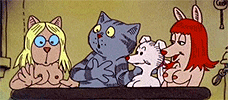
Fritz the Cat
1972 -
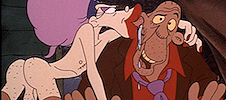
Heavy Traffic
1973 -
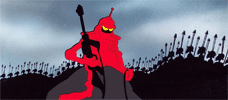
Wizards
1977 -
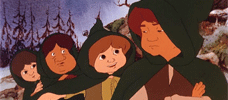
The Lord of the Rings
1978 -
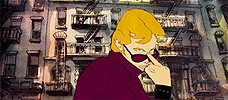
American Pop
1981 -
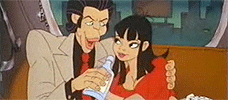
Hey Good Lookin’
1982 -
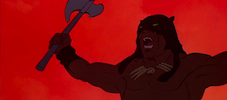
Fire and Ice
1983 -
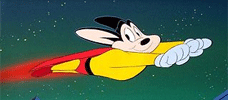
Mighty Mouse: The New Adventures
1987–1988 -

Cool World
1992 -
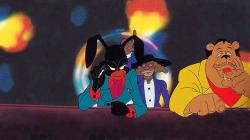
Coonskin
1975
We don’t do comments anymore, but you may contact us here or find us on Twitter or Facebook.



